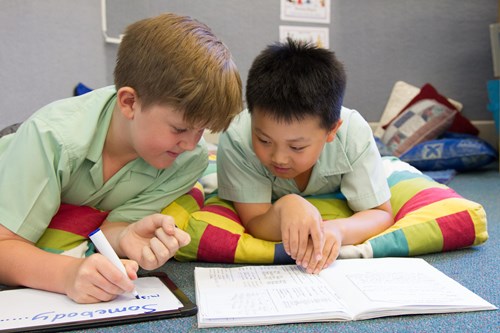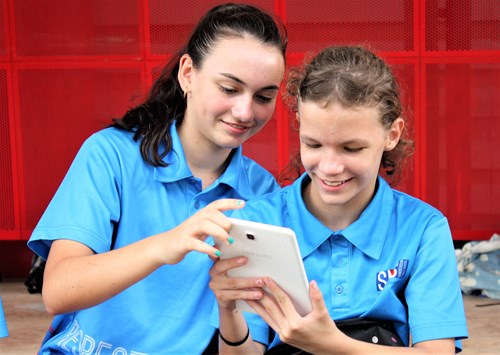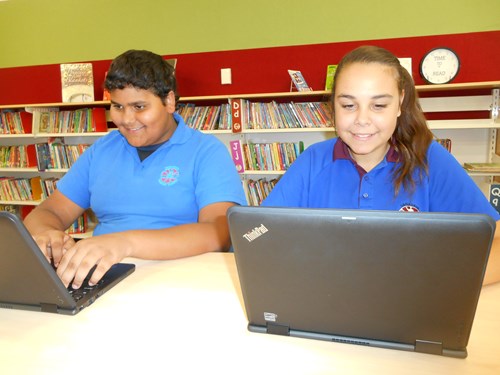State and territory authorities continue to be supported in their implementation of the Australian Curriculum: HPE. Natalie Jonas, the ACARA HPE Curriculum Specialist has provided professional learning opportunities for primary and secondary teachers at conferences run by the Australian Council for Health, Physical Education and Recreation (ACHPER) in South Australia. She will also be attending the ACHPER International Conference in Canberra in January 2019, presenting information on the findings from ACARA’s international comparative studies and involvement in the OECD 2030 project.
Work has been undertaken in collecting and annotating work sample portfolios in F-6/7 HASS. When published, these new portfolios will be able to be viewed using either the HASS achievement standard or the achievement standards of individual sub-strands. Work is also underway on revising and updating the existing work sample portfolios for 7-10 History.
Mark McAndrew, ACARA’s Curriculum Specialist: HASS provided a presentation for the 9th International Conference on Human Rights Education at the University of Western Sydney in November. This was an opportunity to highlight how topics, issues and concepts associated with human rights are addressed in the Australian Curriculum.
Work samples for the first phase languages: Chinese, French, Indonesian, Italian and Japanese, were published on the Australian Curriculum website Resources/publications page in November. Work samples will be added progressively to these portfolios, and stakeholders are encouraged to check the site regularly for updates.
To support the collection of further work samples for second phase languages (Arabic, German, Modern Greek, Spanish and Vietnamese), Languages work sample workshops were held in Western Australia and Victoria after the meeting in South Australia. With the help of Language Specialist teachers, Kirsty Jeffree, ACARA’s Languages Curriculum Specialist has already commenced the selection and annotation of work samples that have been received thus far.
Collection and annotation of new work samples for the Mathematics curriculum (F-10) is underway. ACARA recently held two workshops, in Perth and in Adelaide, as part of the work sample project with the focus on the collection of work samples that enable students to demonstrate their mathematical thinking and understanding.
ACARA has been participating in several exciting international projects as part of our Program of Research. ACARA has been an active participant in the OECD 2030 Mathematics Curriculum Document Analysis (MCDA) project. Rachael Whitney-Smith, ACARA’s curriculum specialist for Mathematics, attended a two-day workshop in Paris where international participants discussed issues regarding 21st century learning and current mathematics curricula. ACARA has also been collaborating with the Center for Curriculum Redesign on a project to investigate the essential mathematics content all students should learn in the future.
ACARA has commenced the collection of new work samples that will showcase student achievement in F-10 Science. Schools from all state and territory jurisdictions are participating in this project with the aim that the new work samples will provide users with a more interactive experience rather than the current work sample portfolios.
Rainer Mittelbach, ACARA's Science Curriculum Specialist, alongside science education specialists from all jurisdictions, has been involved in the review and mapping of test items for NAP-Science Literacy (SL) 2018. For the first time, the NAP-SL assessment has been administered to Year 6 as well as Year 10 students. Once the data analysis (which is currently underway) has been completed, specialists will focus on preparing a chapter for the NAP-SL 2018 report that provides information for teachers to help support student learning.
In October, ACARA published 95 new elaborations for the F-10 Science curriculum that provide opportunities to teach core science concepts and skills through the context of Aboriginal and Torres Strait Islander Histories and Cultures. Each new elaboration will be supported by teacher background information designed to assist teachers in the development of classroom materials. The teacher background information is currently available for Years 7-10, with F-6 information to be completed and progressively released in 2019.
ACARA’s Curriculum Specialist for Technologies, Julie King, continues to support implementation of the Australian Curriculum: Technologies. Julie participated in the Women in STEM Decadal Plan consultation in Sydney, the Australian Curriculum Studies Association symposium in Brisbane, the Early Learning STEM Australia symposium in Canberra, and the Digital Technologies CS4HS events in Tasmania. Videoconferences were hosted by ACARA for Technologies contacts in all jurisdictions to discuss Digital Technologies implementation, and another in December with a focus on Design and Technologies.
The Digital Technologies in Focus team presented at the Australian Council for Computers in Education conference in Sydney. It was a great opportunity for the team to meet with members of other NISA-funded projects, including a full-day planning session with the Australian Computing Academy. Curriculum officers continue to visit the 160 schools participating in the project, to help teachers with planning, demonstrate lessons and present at staff and parent meetings.
ACARA’s Curriculum Specialist for The Arts, Helen Champion, continues to build networks and look for opportunities to support implementation of the Australian Curriculum in The Arts. Helen took part in the Sydney Theatre Company’s School Drama Hub, as well as a STEAM webinar hosted by the Tasmanian Department of Education. The National Association of Arts Educators executive meeting was also hosted at the ACARA Sydney office.
Helen also attended the ‘Every School Should be an Art School’ hosted by Kaldor Art Projects, the University of New South Wales and the Visual Art and Design Education Association (VADEA) and the 2018 Education in Games Summit held at the Australian Centre for the Moving Image. Conversations at these events highlighted the nature of arts practice in the digital era, opportunities and challenges for arts practitioners as the world of work evolves and the ways that The Arts (particularly Media Arts) are being used to promote knowledge of Aboriginal and Torres Strait Islander histories and cultures.
ACARA has commenced work on 12 Illustrations of Practice, led by Danielle Cavanagh, ACARA’s Curriculum Specialist, to demonstrate how schools are effectively using the curriculum to develop Career Education programs. These Illustrations will focus on the place of general capabilities in supporting students to develop and refine the skills and aptitudes needed to make informed decisions about their future. The Illustrations will include schools from across Australia, capturing a full range of learners in diverse learning environments, and will be available mid-2019.
Caty Morris, ACARA’s Curriculum Specialist for the Aboriginal and Torres Strait Islander Priority, has been engaged with schools in remote areas of the Northern Territory and Western Australia to develop further Illustrations of Practice for publication. All of these illustrations will include reference to, and examples of, the new elaborations in Science in schools’ programming and practice.
Caty Morris and Joe Sambono, ACARA’s Curriculum Specialist in Science and Aboriginal and Torres Strait Islander Education, also worked with the Science team to produce the 95 new Science elaborations for the Aboriginal and Torres Strait Islander Histories and Cultures cross-curriculum priority (CCP). You can view them at:
- Examples of elaborations that can be used by teachers
- Content descriptions across all year levels with new elaborations
Click on the hand icon under each of the elaborations in Years 7-10 to access the teacher background information web pages.
ACARA continues to participate in Phase 1 of the OECD 2030 Education and Skills project. Earlier this year we participated in the Curriculum Content Mapping (CCM) trial to develop a heat map which sought to show the degree to which a range of competencies and concepts are targeted in learning area curriculum content. Following from the trial we recently completed the main study of this project. Curriculum specialists worked with external experts in each of the learning areas. The report on the main study findings will be published by the OECD in the first quarter of 2019. We are also participating in the Mathematics Curriculum Document Analysis (MCDA); its purpose is to undertake a mapping of curriculum concepts that underpin mathematics literacy and 21st century skills. Analyses of curriculum and topics in mathematics textbooks will be undertaken in 2019.
The 2017-18 Monitoring Report has been finalised with the key areas for comment this year being around technologies and the ICT capability, and literacy and numeracy across the curriculum. The report, to be published early in 2019, also includes sections on AC website use, a monitoring of media in relation to curriculum matters over the reporting period and learning area specific commentary received in the feedback from states and territories.
The fourth of the curriculum comparative studies has also been finalised and is due for publication early in 2019. This study compares the AC with the New Zealand Curriculum. Previous studies (British Columbia, Finland, Singapore) are published on the AC website, under the resources tab.




